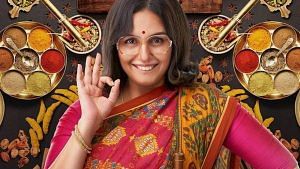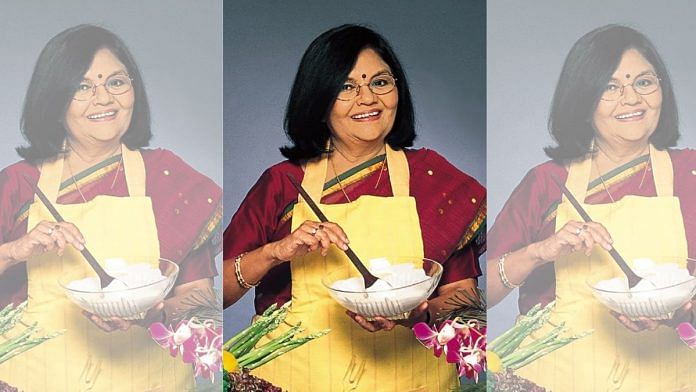In 1966, a quiet food revolution started in a modest apartment on Napean Sea Road in Mumbai. A woman had begun hosting cooking classes for the neighbourhood. Her first cookbook, The Pleasure of Vegetarian Cooking, was released in 1974. It has since sold over 15 lakh copies. The rest is culinary history. Tarla Dalal became a star. First-time cooks, hapless college students abroad, and countless foodies discovered the joy of cooking through her books. Now, Dalal is making history once again as the first Indian chef to get their own biopic, Tarla, starring Huma Qureshi.

“She is the bible of Indian vegetarian cooking,” said Sathya Saran, author and former editor of Femina, which featured Tarla Dalal’s recipes
Dalal was born to a Gujarati family in Pune and moved to Mumbai in 1960 after her marriage to Nalin Dalal. Six years later, she became what we now call an influencer. No such term existed back then to define Dalal’s pioneering work. But who needs labels when one can create an empire?
What made Dalal stand out was the utter simplicity of her recipes, and how she brought Thai, Mexican, and Italian foods into the urban, upper middle-class homes in Northern and Western India.
It wasn’t just her food but also her business acumen that catapulted her to fame. “I started writing cookbooks thanks to Tarla Dalal. I used to be busy with my TV shows and never realised that cookbooks can be a great business,” said Sanjeev Kapoor, one of India’s first ‘celebrity chefs’.
Also read: Chef in Delhi adding Korean twist to paratha, paneer, tikka. He’s an Instagram star
A pioneer
Dalal’s reliable and reassuring voice paved her way into the kitchens of India and beyond.
“When my siblings were going abroad, my mother packed Tarla Dalal recipe books so that they could make Indian food,” said Aditi Dugar, a chef and owner of the fine-dining restaurant, Masque, in Mumbai. Dugar grew up in the same neighbourhood as Dalal, and remembers how her cooking classes were very popular among the women of the locality.
When Vakil & Sons, one of India’s most prominent publishers in the 1970s, learnt about the popularity of Dalal’s classes, they understood it was a goldmine waiting to be unearthed. They collaborated with her in publishing her first cookbook. Published in English, it was also translated into Hindi, Gujarati, Marathi, Bengali and foreign languages such as Dutch and Russian. Dalal was also one of the first chefs to archive her work digitally, an initiative that her son, Sanjay Dalal, now looks after. The website has more than 22,000 recipes, catalogued on the basis of occasion, ingredient, equipment requirement, and cooking method.
“She came at a time when Gujju society was changing, and the aspirational upper middle class wanted variety. She changed their dal-chawal routine,” said Sheela Bhatt, veteran journalist who shared a long friendship with the chef.
Also read: Momos to gin & tonic—a new Indian ‘food bible’ offers trivia, history. But no…
More than cooking
Dalal was a brand of her own. Dressed in signature silk sarees, and sporting a smile, Dalal conducted classes, interviews and wrote more than 100 cookbooks. Dugar remembers Dalal’s impeccable presentation skills.
“Whenever I visited her home, and she was hosting us, the table would be laid impeccably, decorated with flowers,” said Rajnikant Dharamdas Shah, Dalal’s brother.
Despite being self-taught, Dalal had a knack for trying and perfecting new recipes.
“Dalal was to North Indians and Gujaratis what Meenakshi Ammal was to South Indians,” said Saran. Ammal, who published her landmark cookbook Samaithu Paar in 1951, pioneered the field in Tamil Nadu. The Tamil cookbook, which featured 350 traditional recipes, was later translated into Hindi, Telugu, Kannada, and Malayalam. Dalal came a decade later, but her timing and her flair for experimentation made a bigger impact. She was awarded a Padma Shri in 2007, making her the first recipient in the field of cooking. Her recipes became the fail-safe plan to try out new cuisines. With books like The Complete Italian Cookbook, Mexican Cooking, Mughlai Khana, Lebanese, Dalal entered into all avenues of cooking.
Also read: Look beyond Alphonso—Banganapalli to Totapuri, South Indian mangoes thrive in local markets
Immortalised in film
The dining experience transformed under Dalal’s tutelage, and world cuisine made its foray into desi kitchens, albeit with an Indian twist. Her recipes called for ghee in risotto, tomato ketchup in lieu of tomato sauce in lasgna, or potato instead of chicken in murgh musallam. Her sense of innovation takes centre stage in the trailer of the upcoming biopic.
Directed by Piyush Gupta, Tarla chronicles the meteoric success and the journey of the Padma Shri winner, whose fans included the wife of former Prime Minister Manmohan Singh. Huma Qureshi, who plays Dalal in the film, had to undergo voice coaching to get her Gujju accent right. “My mother had a few of her cookbooks and I have been reading them since childhood,” the actor told The Hindu.
The culinary and cinematic world also came together in a unique way, when Qureshi’s father added Dalal’s Batata Musallam to the menu of his Delhi restaurant, Saleem’s, as part of the promotion of the film.
Dalal passed away in 2013 at the age of 77. But her recipes continue to be the saviour for many who wield the ladle for the very first time. “Mothers used to be happy when daughters took her classes. It was considered to be better than a college degree,” said Bhatt
(Edited by Theres Sudeep)



